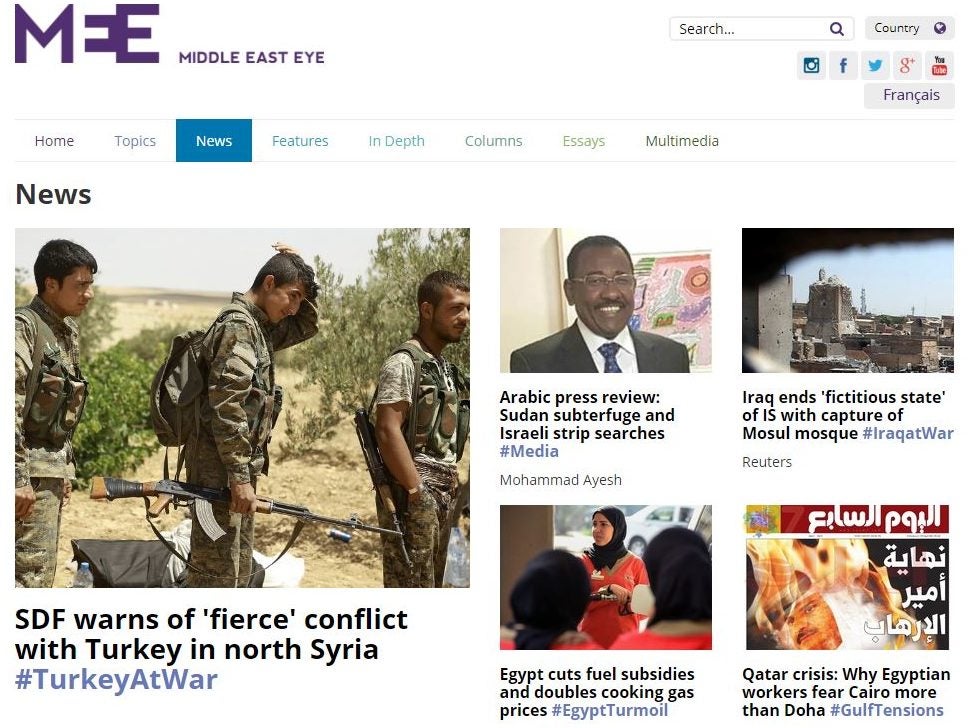
Saudi-led demands made to Qatar as part of a diplomatic crisis in the Gulf region include the closure of independent UK-based publication Middle East Eye, alongside state broadcaster Al Jazeera.
Among the list of 13 demands made by Saudi Arabia, Egypt, Bahrain and the United Arab Emirates is a call for Qatar to “shut down all news outlets” that it funds both indirectly and directly.
Outlets named include the Middle East Eye, Arabi21, Rassd, Al Araby Al Jadeed and Mekameleen. English-language publication The New Arab is also understood to be affected.
Middle East Eye employs 20 journalists and is based in London
Its editor-in-chief David Hearst, told BBC radio: “The business model of Middle East Eye is we sell our journalism to people who translate it into Arabic and other languages and these regimes unfortunately do not want their own citizens learning about what’s going on.
“I have been writing about a palace coup, a power struggle going on between princes in Saudi Arabia. This isn’t boastful, but a lot of what I have said has come to pass and as soon as it did we were shut out and put on this list.”
“We bite every hand,” he said of the publication’s editorial stance. “We actually try and report the region without fear or favour.”
Hearst, a former chief foreign leader writer for the Guardian, added: “The people who want to close us down believe in weaponisation of the media. They believe the media is an instrument and it is a lever. It doesn’t exist in its own right.
“Now there are lots and lots of brave journalists and colleagues of mine who give me information because… it’s too dangerous for them to publish it and it really is a duty to get this stuff out.”
The Saudi-led coalition of Arab states has cut diplomatic ties with Qatar and is enforcing a land, sea and air blockade amid allegations the country has been supporting terrorism – claims it says there is no evidence for.
Tory MP Crispin Blunt, chairman of the foreign affairs select committee, said mediation efforts were under way in the region and that the UK should “be trying to give weight and support” to these efforts.
The demand for Al Jazeera, which is based in Qatari capital Doha, to be shut down is the biggest threat to the broadcaster in its 20-year existence, managing director Giles Trendle told Press Gazette this week.
The station runs two news services, one in English and another in Arabic. Al Jazeera English shares similarities with the editorial approach of the BBC, from where a number of its early staff joined.
Al Jazeera Arabic has been criticised for promoting jihadi perspectives, including having been embedded with Islamic State during the Syrian conflict in 2013.
Guardian Middle Eastern correspondent Martin Chulhov told Press Gazette: “[Al Jazeera Arabic] have wholeheartedly been offering a jihadi perspective on regional events to the detriment of more moderate coverage. At times they have opened themselves up to criticism, but other times it has gone way too far.”
Blunt told BBC radio: “The Qataris are hosting a western-style organisation in Al Jazeera. Certainly Al Jazeera English, its editorial standards look pretty similar to the BBC.
“Al Jazeera Arabic I know less about and there are more concerns about the editorial policy in Al Jazeera Arabic, but certainly what is able to be seen in terms of AJ English is pretty impeccable.”
He added: “Inevitably there has got to be some kind of a relationship [with the Qatari government], but is the BBC compromised by its relationship with the licence fee and therefore being in receipt in affect of the taxpayers income, just a particular tax levy?
He added: “You have then got to look at the editorial standards that the BBC upholds and the oversight of them and then for Al Jazeera English as to whether the parallel holds and I think it does by and large it does.
“What I can’t say is whether the same standards apply on Al Jazeera Arabic.”
He said calls to close the broadcaster were “very concerning” from a media freedom perspective.
Omar Ghobash, the United Arab Emirates’ ambassador to Moscow, told the Guardian: “We do not claim to have press freedom. We do not promote the idea of press freedom. What we talk about is responsibility in speech.
“Freedom of speech has different constraints in different places. Speech in our part of the world has a particular context, and that context can go from peaceful to violent in no time simply because of words that are spoken.”
Email pged@pressgazette.co.uk to point out mistakes, provide story tips or send in a letter for publication on our "Letters Page" blog
